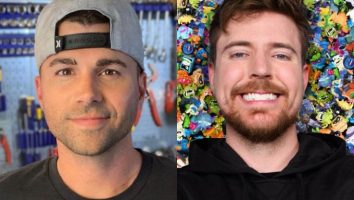As an orthotist for nearly 30 years, Joseph Ruscito has produced his fair share of orthotic braces and prosthetic limbs and he has witnessed the shame that envelops children who suffer from cerebral palsy, or who are born without arms or legs, when they learn that they must wear them.
Five years ago, he and his partner developed a method of dying paper transfers of different colors and shapes into the braces and limbs. It was an expensive process at first, but it worked and the kids responded positively to having something take the place of the dull, white plastic, says Ruscito, CEO of Positive Image Orthotics, a company that produces orthotic and prosthetic devices, based in Toms River, New Jersey.
‘It’s a question of self-esteem,’ says Ruscito. ‘These kids understand everything that normal kids do. They watch the same cartoons and they want to wear the same clothes, but they’ve got to wear this ugly white plastic brace.’
In 1994, Ruscito went in search of licenses from companies that owned popular children’s characters. He soon signed deals with Michael Tabakin, then at Turner Home Entertainment (now at Toys ‘R’ Us), to use characters from The Flintstones and The Jetsons, then struck a deal with Christina Surette at Warner Bros. Consumer Products to use all of the Looney Tunes personalities. Other companies, such as the NFL, NHL, Marvel Comics, Nickelodeon and Harley Davidson, would come on board in the next two years. Positive Image sells the transfers to orthotic and prosthetic manufacturers, which then offer them free to kids when they come to get fitted for a brace or a limb. Today, sales of transfers account for 90 percent of Ruscito’s business.
For the entertainment producers, the appeal of signing deals with Positive Image seems obvious-great PR.
‘Kids are our main target for the growth of [hockey]. So, if we can help some kids feel a little bit better when they’re down and out, it’s more important for us than the money is,’ says Tracey Cohen, manager of communications for the NHL.
Licensing good causes, however, is not always a slam dunk. Before Marvel Comics signed on with Positive Image last year, it had an agreement with another company to produce asthma inhaler covers using images of Marvel Comics superheroes. That deal fell through, though, after Marvel realized how high the insurance premiums would be for licensing such a product, says Regina Massaro, a senior account executive at Marvel. There was concern that kids, seeing pictures of their heroes on the covers, might try and emulate the characters’ superhuman powers and use the inhalers too much. Fortunately for Positive Image, children are not compelled to use its products in a similar fashion. Nevertheless, some companies declined initially to sign on for fear of being perceived as if they were making money off the handicapped, says Ruscito. Perhaps because of that perception, companies have granted Positive Image generous deals, with most claiming only 12 percent of the royalties on each transfer, which range in price from US$4 to US$10. (The NHL and the NFL gave Positive Image the right to use the logos of its teams for free.)
The transfers will not make licensors or himself millions of dollars, says Ruscito, but, then, that’s not his goal. His aim is to make as many images available to kids as possible and, so far, he’s pleased with the number of companies he’s managed to bring on board, especially, he admits proudly, considering that he knew nothing about the licensing business when he started. That may be so, but he certainly knows something about the art of the hard sell. In 1995, Ruscito went to the Licensing Show in New York, armed with a prosthetic limb and an orthotic brace and a television crew from Channel 7’s Eyewitness News in New York. He walked from booth to booth trying to sell his idea to various agents. Most wouldn’t talk to him on camera, but he did manage to corner Mark Freedman, president of Surge Licensing and agent for the Teenage Mutant Ninja Turtles property. Ruscito can’t help but laugh as he recounts the meeting. ‘Here I am on camera holding this brace [and saying] ‘wouldn’t it be wonderful if you could put the Teenage Mutant Ninja Turtles on this poor kid’s brace?’ Well, what can you say? You’re going to say ‘no’?’
Freedman didn’t. Two weeks later, he sent a licensing contract to Ruscito offering Positive Image the right to use the turtles.
ï
Teletubbies to play with PBS Home Video
In a multiyear agreement, The itsy bitsy Entertainment Company and PBS Home Video are teaming up to release the Teletubbies on home video. The agreement grants PBS Home Video, in conjunction with distribution partner Warner Home Video, North American production and distribution rights for Teletubbies home videos under the PBS Kids brand. Scheduled for release beginning this fall, the first product introductions will be two hour-long programs created especially for home video. PBS Home Video’s initial plans for 1999 include direct promotional opportunities with national consumer products companies, as well as other Teletubbies licensees, such as Hasbro and Eden.
ï Sesame Street connects with kids by telephone
Comfy Inc., an interactive technology company that creates hardware and software products for young children, is developing a series of interactive telephone and CD-ROM products starring Sesame Street’s Elmo, Bert and Ernie, Big Bird and other characters from the program. Kids push buttons on the telephone and talk into the receiver to interact with the Sesame Street characters on their computer screens. Children can also play games using the included CD-ROM. The phones are expected to be ready in the third quarter of 1998. The suggested retail price is US$49.





















